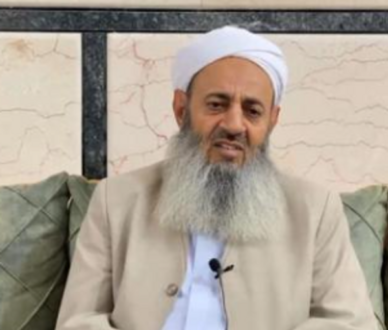Iranwire – The Sunni Friday prayer leader of Zahedan, Molavi Abdolhamid, has been a key dissenting voice inside Iran since the eruption of months-long nationwide protests against the Islamic Republic.
Iran’s top Sunni cleric routinely uses his Friday sermons to denounce the deadly government crackdown on the protest movement and to criticize the policies of the country’s Shia clerical rulers, including regarding the economy and women’s rights.
Zahedan is the capital of Sistan and Baluchistan, home to Iran’s Sunni Baluch minority of up to 2 million people.
Every week, residents have been holding protest rallies in the city after Molavi’s sermons in Makki Mosque since September 30, when security forces killed dozens of protesters.
With his speeches gaining widespread support across the country, the 76-year-old cleric became the voice of the dissatisfied Iranian citizens.
But some are wondering why he did not speak out against the Islamic Republic earlier.
Taliban’s Return to Power
Molavi has been vocal about human rights violations for about 15 years, and when he welcomed the Taliban’s return to power in neighboring Afghanistan, it came as a surprise to many.
In a speech delivered in the summer of 2021, he referred to the Taliban as a “reality” in Afghanistan and emphasized that the members of the group were “different from their predecessors” and have “shown capabilities.”
He also praised the Afghan Taliban for announcing a general amnesty and claiming that “they are not seeking violence.”
These remarks drew criticism from human rights defenders, and the Center for Human Rights Defenders in Iran took back the award it had previously given to Molavi for his efforts to advance the rights of ethnic minorities.
Last year, however, he condemned the Taliban’s ban on girls’ education while also criticizing violation of women’s rights in Iran.
“Which clause in Sharia law did the Taliban use to prevent girls’ education?” the cleric asked.
Call for Referendum
Molavi has consistently criticized restrictions imposed by the Islamic Republic on the country’s Sunni minority.
The cleric has called for the lifting of restrictions on building Sunni mosques in Tehran and for an end to Shia organizations’ verbal and physical attacks against Sunnis.
In addition, he has demanded that Sunnis be appointed in government positions.
Over the past months, he has called for fundamental changes in the way Iran is governed, saying on March 17 that “one ethnic group and one religion cannot rule the country.”
In a speech on November 5, he said the constitution should be changed because “the majority of the people are unhappy.”
“If you don’t agree, hold a referendum in the presence of international observers and accept the result,” he added.
Khamenei Blamed for “Black Friday”
Over the years, Molavi has written to Supreme Leader Ali Khamenei multiple times regarding the execution of Sunni prisoners, discrimination against Sunnis and the dismissal of a Sunni Friday prayer Imam.
Despite his efforts, the treatment of Sunnis in Iran has not improved.
In his recent speeches, the cleric openly criticized senior Islamic Republic officials.
On October 21, he held Khamenei and other officials responsible for the “Bloody Friday” massacre.
“The leadership of the Islamic Republic, under whose command all the armed forces are, are all responsible, and no one can avoid this responsibility,” he said.
Before the ongoing wave of protests erupted in September, Molavi denounced the execution of political activists and spoke out against the use of torture and forced “confessions,” arguing that such practices are “contrary to Islam.”
On December 9 he called the execution of a protester, Mohsen Shekari, “illegal.” He also strongly denounced the use of the death penalty in his January 27 sermon.
He also drew attention to the torture and rape of prisoners, asking, “Who authorized these orders?”
Khamenei was on everyone’s mind.
 Shabtabnews In this dark night, I have lost my way – Arise from a corner, oh you the star of guidance.
Shabtabnews In this dark night, I have lost my way – Arise from a corner, oh you the star of guidance.



